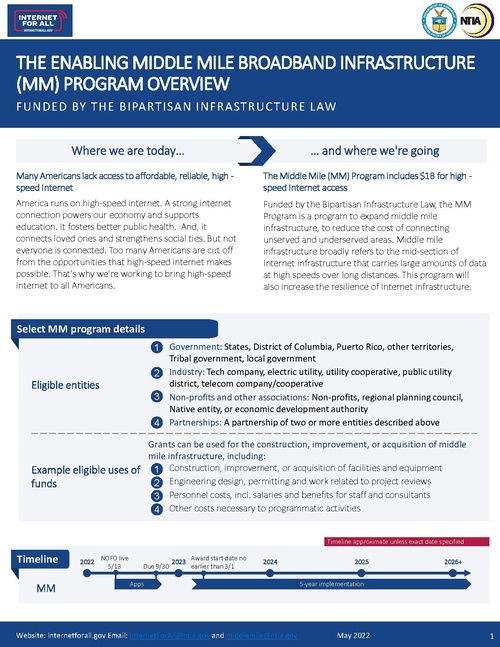Enabling Middle Mile Broadband Infrastructure: Difference between revisions
Jump to navigation
Jump to search
Created page with "{{News |Image=Ntia ifa logo wifa url white on blue.png |Published=2022-06-21 |Organization=NTIA |poc=InternetForAll@ntia.gov, middlemile@ntia.gov |Where=Washington DC |Summary..." |
No edit summary |
||
| Line 9: | Line 9: | ||
|Display=Yes | |Display=Yes | ||
|sector=Wireless | |sector=Wireless | ||
|chapter=Low Income Housing | |||
|Release=MM Info Sheet - IFA Launch - Final.pdf | |||
|Tag=Equity | |Tag=Equity | ||
}} | }} | ||
Local networks are important for bringing high-speed internet to communities. But local networks aren't enough. They need to connect to robust, high-capacity national and regional networks. Middle mile infrastructure makes this possible. By connecting to major networks, local networks can ensure reliable high-speed internet service for even the most remote communities. | Local networks are important for bringing high-speed internet to communities. But local networks aren't enough. They need to connect to robust, high-capacity national and regional networks. Middle mile infrastructure makes this possible. By connecting to major networks, local networks can ensure reliable high-speed internet service for even the most remote communities. | ||
Latest revision as of 04:59, January 17, 2023
| News | |
| Image | 
|
|---|---|
| Published | 2022-06-21 |
| Point(s) of Contact | InternetForAll@ntia.gov middlemile@ntia.gov |
| Organization(s) | NTIA |
| Where | Washington DC |
| Display | Yes |

| |
The Enabling Middle Mile Broadband Infrastructure Program provides funding for this vital part of our nation's high-speed network. With $1 billion in funding, the program will reduce the cost of bringing high-speed internet to unserved and underserved communities.
Local networks are important for bringing high-speed internet to communities. But local networks aren't enough. They need to connect to robust, high-capacity national and regional networks. Middle mile infrastructure makes this possible. By connecting to major networks, local networks can ensure reliable high-speed internet service for even the most remote communities.